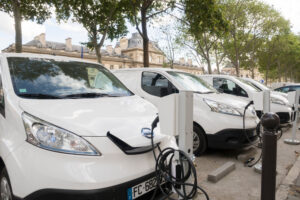
Around 57 per cent of van owners feel discouraged from going electric due to a lack of charging points, according to a survey published today.
Data from the Society of Motor Manufacturers and Traders (SMMT) revealed that even though more than a third of all new models come with the ability to be charged, only one in 20 buyers has switched to electric.
Electric van uptake is currently two years behind that of cars – where the ratio between electric and fuel is one to five – as a fifth of owners said it would postpone the decision between three and seven years.
“There’s an electric van to suit every business case, but we need a ‘van plan’ to ensure zero-emission driving works for the millions of people for whom their van is their livelihood and the millions more who rely on these workhorses for the delivery of their daily needs,” said SMMT’s chief executive Mike Hawes.
The industry called on the government to play their part and help people go green, as 58 per cent of respondents said they might be convinced to switch to an electric van if there were more charging points.
“The automotive industry is getting these new technology vehicles into the showrooms – we need government and other stakeholders to match our commitments to get them out on the road,” Hawes added.
Believing that trucks shouldn’t rely on charging points, Asher Bennett, chief executive of electric and hydrogen maker Tevva, developed an electric truck with a small reserve of hydrogen power to boost range extension.
“The range extender is on the truck but it’s not necessarily meant to be used, it’s there to remove any risk [of trucks running out of battery],” .
“By removing all the risks, there will be days that absolutely you will need to turn on the range extender and that allows you to get back to the depot or do that longer range. And that’s great, that’s what it’s meant for.”
Read more:
Van owners discouraged from going electric due to lack of charging points





